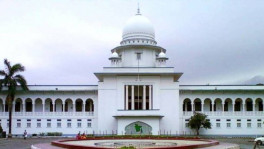Introduce social insurance, schemes for informal workers: Sanem
The local think-tank also said an overhaul of the existing social safety system is urgent

The local think-tank South Asian Network on Economic Modeling, widely known as Sanem, has urged the government to redesign its social safety structure with the inclusion of social insurance, active labour market programmes and social care initiatives, in the interest of sustainable development.
"We need an overhaul in the social safety system as it lacks many important things," Sanem Chairman Bazlul Haque Khondker said while presenting a report on the current situation of the country's social protection system and future priorities at a webinar on Thursday.
For example, women, children and informal sector workers are the great sufferers of the pandemic but they are not included in the safety net, he explained, and added that even the demographic dividend has not been reflected in the existing safety programmes.
"Social insurance is now a need for the vulnerable middle class. Active labour market programmes for workers, particularly those in the informal sector, are urgent. At the same time, social care should be introduced for the elderly and sick people and children," the Sanem Chairman said.
If social insurance is introduced, some 55-65% of the vulnerable middle class can be included in the social safety net, he said, adding that interestingly the government does not need any investment in such types of insurance as unemployment insurance, maternity insurance, survivors insurance, old age pension and family insurance.
"The private sector will have the opportunity to invest there."

Bazlul Haque Khondker suggested that formal sector employers should mandatorily have employee welfare funds such as pension fund, accident fund, and maternity service fund.
"We also have to think about our informal sector workers for inclusive social protection. They are now outside the safety net."
He recommended some funds for informal workers with their active participation, which the government will also contribute to. "In this way, almost 88% of informal workers can be brought under the social security net."
"We also need social care programmes for children, elderly and critically ill people, which are available in many countries. Unfortunately, we are yet to have such programmes."
The Sanem chief said additional funds to the tune of 2-3% of GDP will be required to run a fully effective social security system, where the government will need to invest one-third or half of it and the rest will come from the private sector.
If the government can create a good institution, it is possible to secure financing from the private sector, he added, citing Thailand as an example.
"The key reason behind our low allocation on social security is that our tax to GDP ratio is low, hovering near 9%. If the ratio can be increased by 2-3 percentage points, it is possible to spend the required amount on social security schemes."
According to the Sanem report, currently some 3% of GDP is going to social assistance programmes, where only 35% of the population is benefited. "Yet we have no exact database on the beneficiaries, which is why many poor people are still outside the net."
There are currently over 150 social security programmes in the country, from which a poor person is getting Tk600 in assistance on average, it said.
"It is not possible to eliminate poverty with such a meagre amount of assistance. The effectiveness rate of the social security programmes is only 0.6%. Moreover, many of those who deserve social security support are being deprived of the benefits [calculated as excursion errors]."
Excursion errors were 71% in 2016, the report said, citing official data, which means only 29% of people in need used to get assistance.
For the convenience of monitoring, the Sanem Chairman suggested merging the safety net programmes into 10-12. He also called for a properly proportionate distribution of safety assistance in urban and rural areas.
"Many people are still deprived, as the government is weak in identifying eligible ones and monitoring distribution due to a low budget for administrative expenses," he added, calling for an increased budget to deal with the issue.


 Keep updated, follow The Business Standard's Google news channel
Keep updated, follow The Business Standard's Google news channel















